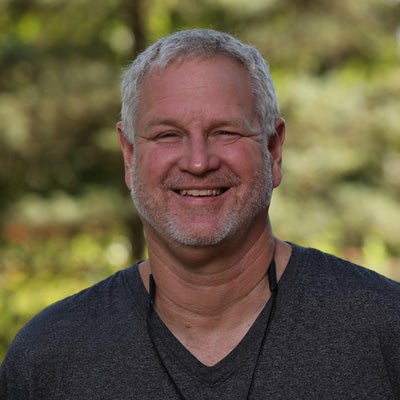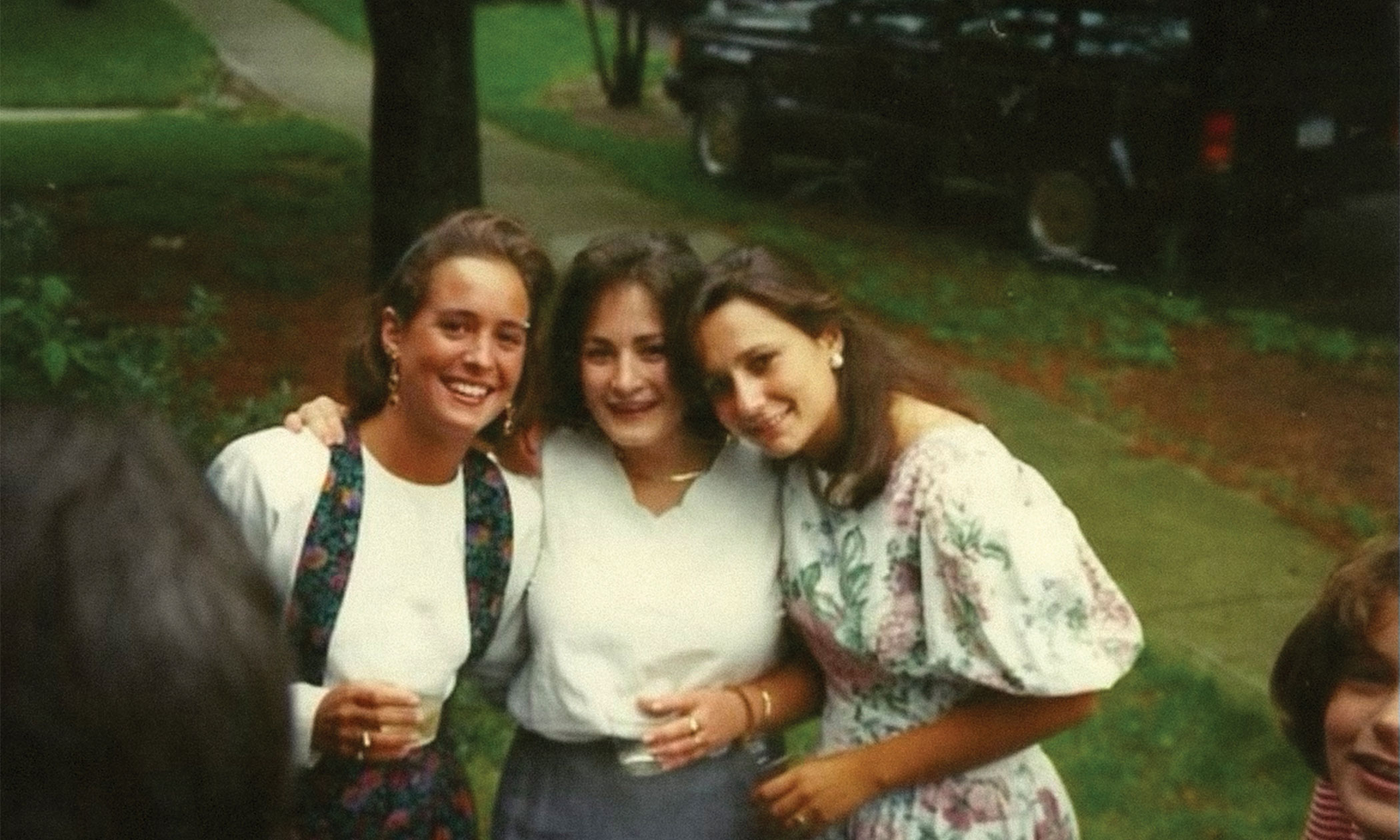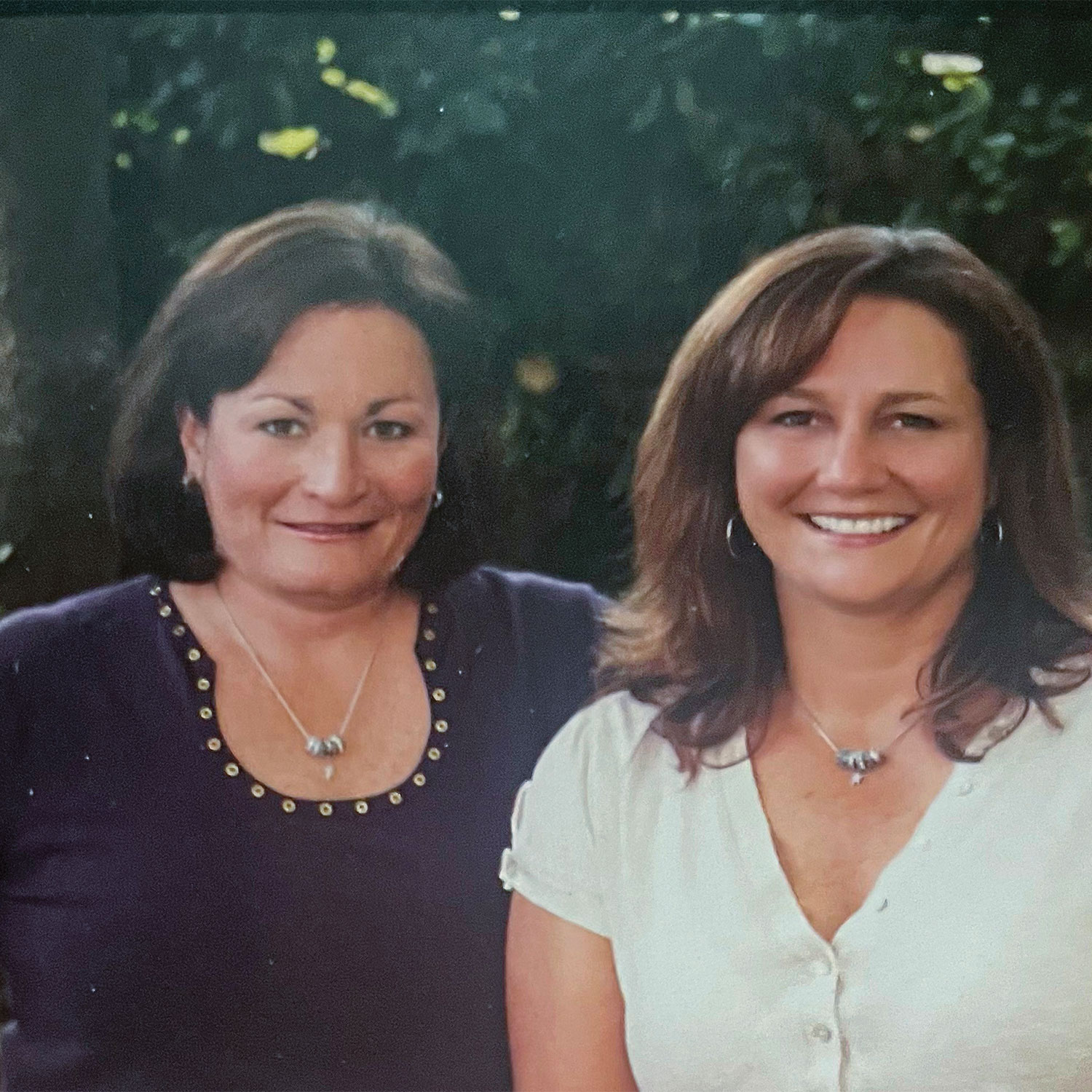In need of luck, Katie McConnell Oliver ’90 tried purchasing some in the winter of 2007.
Married with two small children, Oliver was facing an uncertain future due to kidney failure. A transplant was recommended, but some potential donors within her family had the wrong blood type, while others had their own health issues.
On a whim, Oliver bought a wishbone charm necklace.
“The string was like dental floss,” she recalled. “The idea is to make a wish, and when the string breaks, your wish will come true.”
Oliver didn’t want to publicize her illness, but she did confide in close friends, including her Denison classmate Amy Baumstark Stivers ’90. They had met in their first year on The Hill and discovered to their delight that each was a St. Louis native.
Oliver and Stivers were among a group of eight women from the Class of 1990 that remains tight. They have vacationed together and attended each other’s weddings. When Oliver gave birth to her daughter, Emmie, she asked Stivers to be the godmother.
With her friend’s permission, Stivers wrote an email to their circle of Denison friends, explaining Oliver’s condition. It wasn’t a solicitation for donors; it was a simple request to keep Oliver in their thoughts.
“Looking back, all of us relied on each other at Denison,” Stivers said. “We had gone through a lot of things together and we stayed in each other’s lives.”
Two months after the diagnosis, the string on Oliver’s wishbone necklace broke. Within hours, she received a phone call from an old classmate.
“Katie,” the voice on the other end of the line said. “We’re a match.”
‘This was my purpose’
Monica Weakley ’90 met Oliver during the second semester of their first year at Denison. They became fast friends.
“Monica was a lot of fun,” Oliver said. “I liked her immediately.” “Monica was the life of the party,” Stivers said.
Adult life has a way of loosening college bonds. Friends often go their separate ways after commencement. Careers and family obligations add distance.
But Denison’s requirement that all students live on campus creates bonds that are hard to break.
“We were always around each other,” Oliver said. “Nobody was living down The Hill, so we all stayed really close.”
When Weakley, a real estate agent in Cincinnati, read Stivers’ email, she was overcome by a feeling she remains at a loss to explain.
“I knew at that moment, I was going to be the one,” she said.
Weakley’s wife, Sharon, tried to temper her enthusiasm. The living organ donation process is long and complex. Any number of factors could lead to disqualification.
Medical personnel require assurances from the donor that they understand the risks involved. They remind prospective donors that they can change their mind at any time. Some decide not to donate because a family member might someday need the same organ.
Weakley never hesitated. She was the first person to be tested.
“I knew this was my purpose, and it was a lot bigger than me,” she said.
‘I felt better immediately’
On the morning of Sept. 11, 2007, Oliver and Weakley were lying on gurneys in the hallway of the University of Utah Hospital. They embraced and wished each other luck ahead of their surgeries.
“It was super emotional,” Weakley recalled. “Both families were there, both sets of parents. Everyone was nervous.”
Doctors could not believe the women weren’t related because the organ match was almost perfect.
“When I woke up, the doctor told me the kidney was already working,” Oliver said. “I felt better immediately.”
Oliver and her loved ones have difficulty expressing enough gratitude to Weakley. The families got together the following year in St. Louis for a celebration, and every year on Thanksgiving, Oliver’s parents send Weakley a bouquet of flowers.
“What people sometimes forget is the donor gets something out of this as well,” Weakley said. “They get a feeling of great purpose and joy.”
As the families gathered for the St. Louis reunion, nobody could imagine there would be one more twist in the tale.
One more Denison connection to add to the story.
Paying it forward
Weakley could not believe the timing of her friend’s 2019 phone call. Oliver just wanted to chat — two old Denisonians catching up.
What Oliver heard staggered her. Weakley’s mother, Nancy, had taken ill. She needed a kidney transplant.
Weakley chose her words carefully, neglecting to mention that mother and daughter shared the same rare blood type and likely would have been a match. She reassured Oliver there were no regrets.
“I didn’t want her to feel guilty, and I knew in my heart we would find a donor,” Weakley said.
She recorded a video talking about her mother’s health issue and posted it on Facebook. Within days, Weakley heard from 15 volunteers willing to get tested.
“What Monica had done for me brought so much awareness to kidney donation,” Oliver said. “A lot of people stepped up to help her.”
And this is where the story circles back to Denison.
After graduation, Weakley moved to Washington, D.C., with Anne Bearry Nicholson ’90, another member of their friend group.
Two years later, Weakley returned home to Cincinnati. She needed a job. Nicholson recommended interviewing for a sales rep position at her uncle’s company, Aerospace Alloys. Weakley got the job and became friends with a woman in the accounting department, Robin Tackett.
Tackett agreed to get tested and proved to be a good match. Nancy Weakley received her transplant in 2020. Today she is 75 and in great health.
“If Anne doesn’t tell me about her uncle’s company, I never meet Robin,” Weakley said. “The power of Denison connections.”
According to the National Kidney Foundation, the average time on a national transplant waiting list can range from three to five years. That’s why volunteers willing to donate a kidney to friends and loved ones is invaluable.
“Monica and Katie were always really good friends,” Stivers said. “Now, they share a bond that will last forever.”



